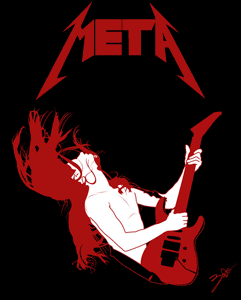There aren’t a whole lot of similarities between a Heavy Metal Musician and a Search Engine Optimizer. One dreams about super stardom while the other dreams about limitless web traffic. Arena rockers jam the Keytar while SEO specialists master the Keyword. The Headbanger blows out stadiums of thousands with distorted bar chords. The SEO guru tweaks META Tags, H1’s, Robots.txt, and backlinks.
Still, there are a few things they agree on. Just like the main riff of Megadeath’s “Addicted to Chaos” search engine optimizers utilize harmonious algorithms to do their work. Popularity determines status in both worlds, whether you are dating Pam Anderson or get an inbound link from Wikipedia. Lastly, the mullet is a non-surprising commonplace in both industries, e.g., “Metal Mullet” & “SEO Mullet“.
In this edition of the Fish Wrap I will break down META tags and demonstrate how they can help your website get more action than a Twisted Sister curling iron.
What are these ‘META’ tags?
A META tag is actually a code snippet at the top of an HTML document. These tags are meant to describe the contents of a web page to Spiders, Bots and Browsers, so they are usually hidden from human users. You can see the actual META tags by clicking ‘View Source’ in your favorite web browser.
There are a hearty handful of META tags available, but the two that determine whether your website is a Judas Priest or a Def Leppard. Those are the TITLE and the DESCRIPTION.
Where do they appear?
Search engines display the contents of your META tags on their search engine results page (SERP). In a sense META tags are your billboard for the Internet. The TITLE acts as a headline, while the DESCRIPTION serves as your ad copy. Meta tags should not only be filled with valuable keywords, they should also stand out and entice users to click through.
Consider these examples taken from a Google SERP page:
The title gives hints that the website is about a heavy metal book, but a searcher can’t determine much more. The Webmaster could have added an ISBN number and a couple more keywords. The description tag was not employed, so the search engine displays the first words on the page instead. Ironically, the book is about trains and tunnels, but it probably receives more visits from Dio fans than railroad enthusiasts. Know your audience and optimize for them.
Much better. This webmaster tagged the website with keywords and descriptive copy. The visitor knows exactly what is offered by the site and what can be expected before even visiting. A META set like this will draw more qualified traffic and reduce bounces.
What makes a good title tag?
The title tag should be specific about the contents of your web page. Google will read about 255 characters in a title tag, but only displays about seven words on average in the search results. These seven words should contain the name of a website or company along with a few keywords about what the website is marketing. Check out these samples on a scale of poser to guitar hero.
Winger:
<title>!!! Welcome to my website !!! <title>
Motley Crue:
<title>Heavy Metal | Home</title >
Iron Maiden:
<title>HeavyMetal.org | Heavy Metal Radio, News, Lyrics, Tabs, and wares.</title>
How about the description tag?
The description tag takes over where the title tag leaves off. This is a short pitch about what your website offers, and a call to action to initiate a click through. Description tags can contain much more content than the title, but the first sentence or two are the most important. Consider these descriptions on a scale of wuss to thrash.
Cinderella:
<meta name="description" content="Website generated by by AngelFire.com">
Guns N’ Roses:
<meta name="description" content="Welcome to the home page of Ashes to Ashes. We're a rock band from Raleigh, North Carolina. Check out our MySpace!">
Slayer:
<meta name="description" content="Your source for up-to-the-minute Metal news, stories and articles. Follow and comment on band blogs from Metallica, Iron Maiden, Slayer, Judas Preist and many more.">
Metal Chic and Ultra Geek?
Bottom line is geeks need metal and metal needs geeks. Without metal there would be no soundtrack for late night World of Warcraft gaming. Without geeks there would be no “unofficial” band fan websites. Not convinced of this cyclical relationship? Watch ACDC’s new video made entirely with Microsoft Excel macros and decide for yourself: http://www.acdcrocks.com/excel/



